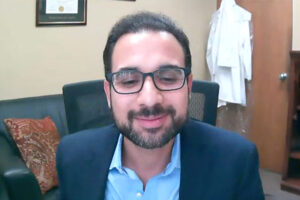
COVID-19 is not an equal opportunity infection. All are vulnerable, but the pandemic has particularly destructive effects in minority communities across the United States.
“Access and outcomes became much worse during COVID,” said Akram M. Zaaqoq, MD, MPH, Assistant Professor of Medicine, Georgetown University. “According to the CDC, compared to Whites, American Indians and Alaska Natives were 1.7 times more likely to have COVID, 3.5 times more likely to be hospitalized, and 2.4 times more likely to die. For Blacks, those numbers were 1.1, 2.8, and 2.0; for Hispanics, 1.5, 2.8, and 2.3. The real numbers are much worse because we are only analyzing patients who have access to health care. That is not reflective of reality because access to care is negatively affected by social vulnerability.”
Dr. Zaaqoq led the panel discussion, Racism in Health Care: The Fuel That Lit the COVID-19 Fire on Monday.
“The data support known disparities within the health care system that are the result of social determinants, including access to quality education and health care, economic stability, and the living environment,” he said. “To begin addressing the problem, we need to first begin talking about the issue with a consistent message to expand health care, establish equitable care models, and to address the social determinants of health.”

Racism in health care is by no means a modern phenomenon—it began when the first shipment of slaves arrived in what is now Hampton, Virginia, aboard an English privateer in 1619.
“There was no clarity at the time on differences between black and white,” said Nneka O. Sederstrom, PhD, MPH, FCCP, Chief Health Equity Officer for Hennepin Healthcare. “Those first slaves were made Black by people who decided they were White and superior because they were buying people of a different skin color.”
Slaves got minimal to no health care, a situation that improved little with Emancipation. Early federal programs created to bring health care to newly freed populations were designed to fail with too few physicians and too few resources. And when they failed, it gave rise to myths of biological differences.
“The highest echelons, starting with President Andrew Jackson, said that investing in hospitals for Black patients was ‘wasteful and foolish’ because of supposed biological differences,” she said. “Blacks were left to fend for themselves. If they were admitted to hospitals, they were relegated to the basement.”
Conditions improved little until the creation of Medicare, which required hospitals to abide by the Civil Rights Act. Reimbursement lured 3,000 hospitals to desegregate in 4 months.

“The culture of hospitals didn’t change,” Dr. Sederstrom noted. “Black patients were being cared for by White clinicians who believed they should not be caring for them. Physicians are still trained on white bodies while brown and black bodies are classified as ‘other.’ We need to make changing that culture of White supremacy a priority.”
The racism that led to inequalities in education, housing, income, environment, transportation, health care, and other areas exacerbated COVID-19 in non-White communities. In California, where early adoption of the Affordable Care Act and Medicaid expansion reduced health care disparities to some degree, minority communities still bore starkly unequal impact.
A survey across Sutter Health, with 3.5 million patients, found that 56% of White patients were tested in ambulatory care settings vs 29% of Black patients. More often, Black patients were tested in the emergency department (38%) or after admission (32%).
“We saw in California that African Americans were 2.7 times more likely to be hospitalized for COVID-19 than Whites because they were more ill when they presented,” said intensivist Ronald D. Collier, MD. “COVID is a perfect storm of social inequality.”
There are no quick solutions, but advocacy at the national, state, local, and personal levels can make a difference.
“We have to take leadership,” Dr. Sederstrom said. “No one else is going to lead the charge to equality. I can’t change patient zip codes and I can’t change the impact of redlining. What I can do is create opportunities for change at the bedside for our physicians, residents, and patients. We can all affect the patients who are in front of us.”
Missed this session? Watch the recording in the “Live Session Recordings” tab of the On Demand section in the meeting platform. Recordings will be available approximately 48 hours after the original session time.
NOW IN SESSION
CHEST 2021 • OCTOBER 17-20 • INFORM. INSPIRE. INNOVATE.
Immerse yourself in the experience of CHEST 2021! Your registration includes hundreds of sessions presented by our top faculty and featured speakers, live discussions with the experts, interactive gaming, and much more. Even better, you’ll have access to everything (including post-meeting bonus content) until October 2022!
Haven’t registered yet? It’s not too late. Register now for full access.





